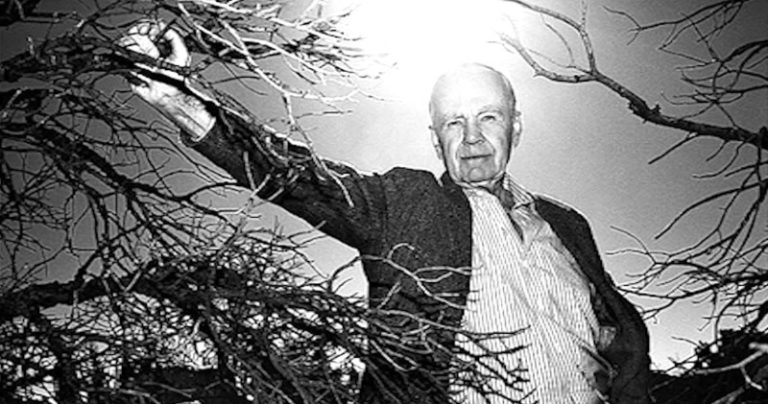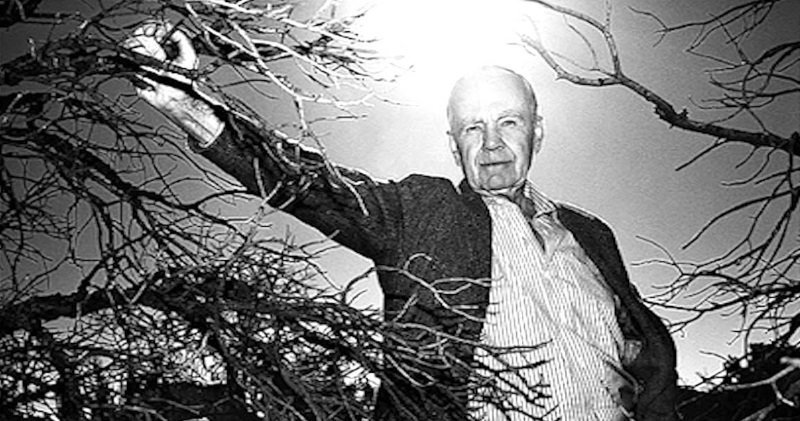
Cormac McCarthy is one of this generation's greatest literary voices — his writing has and will surely stand the test of time.
His fifth novel, Blood Meridian, was featured within the 2005 Time Magazine's list of the 100 Best English-language Books Since 1923. His novel All the Pretty Horses won both the U.S. National Book Award and National Book Critics Circle Award. Unlike his previous novels at the time, All the Pretty Horses was a publishing sensation. It became a New York Times bestseller and sold 190,000 copies in hardcover within the first six months of publication, finally giving McCarthy the wide readership that had eluded him for so many years. McCarthy used the money he made from that novel to buy a new pickup truck. The breakthrough novel was later adapted into a feature film directed by Billy Bob Thornton, starring Matt Damon.
His No Country for Old Men — originally written as a screenplay — was adapted into the 2007 feature film of the same name, adapted by Joel and Ethan Coen, and went on to win four Academy Awards, including Best Picture and Best Adapted Screenplay.
His novel The Road was celebrated with international acclaim, winning a Pulitzer Prize and then later adapted into a feature film starring Viggo Mortensen.
Acclaim and resume aside, McCarthy has become a cult figure with legendary status as the most celebrated recluse in American literature since J.D. Salinger. One that has granted only a handful of interviews. He doesn’t do book tours, readings, or signings. He doesn't intermingle with the literary society — instead preferring the company of billiards players, card sharks, and especially scientists at the Santa Fe Institute where he spends most of his free time. Beyond all of that and what can be read from his upbringing and literary notables, that's all we truly know about him.
What's even more interesting is that he hates sharing writing advice. He shuns interviews on the subject and relishes in conversation about anything but writing. Thus the research for this feature post was exhaustive. We utilized quotes from his interviews with Rolling Stone, Wall Street Journal, The New York Times, as well as his even more rare on-camera interviewer with Oprah Winfrey. We even looked into his only other interviews published in German and Spanish trades.
So here we have perhaps the ultimate collection of Cormac McCarthy quotes on writing. These twenty-five quotes will be followed by our own elaboration on how these words from a legend can best be applied to you and your writing.
1. "Your busiest day might be watching some ants carrying bread crumbs."
The writing process isn't always about typing. It's often about examining the world around us. Searching for inspiration. It's about daydreaming, imagining, and pondering until those fingers of yours find themselves stroking the keyboard as images, concepts, stories, and characters come alive.
Writing is a process. Anyone that says they physically write for eight hours a day — or even a few hours a day — is exaggerating the truth.
2. "I want, even for the worst of the characters, grace under pressure, some slinking nobility."
The best characters are those that are real, with conflicting values. Characters that are evil people showcasing noble characteristics or good people wearing their flaws and moral struggles out in the open for the audience to see. The greatest characters don't live in the white or in the black — they live in that gray area in between.
3. "If you're good at something it's very hard not to do it."
The thrill of writing is being good at it. That causes you to never struggle through a sentence, a paragraph, a sequence, a chapter, or a scene.
4. "In talking to older people who've had good lives, inevitably half of them will say, 'The most significant thing in my life is that I've been extraordinarily lucky.' And when you hear that you know you're hearing the truth. It doesn't diminish their talent or industry. You can have all that and fail."
The sad and equally exciting truth to success in the literary world and Hollywood is that luck comes into play more often than not. And your outlook on luck can differ. Some call it blessings from a high power. Others chalk it up to fate. Regardless, most writers will eventually feel an invisible force guiding them through their writing journey. Embrace it.
5. "Look, a novel's a novel and a film's a film, and they're very different."
Take it from an author that has seen his novels adapted to the screen — arguably two of which (No Country for Old Men and The Road) were adapted to a near perfect degree. The film adaptation of All the Pretty Horses, however, differs vastly from the book. McCarthy is on record saying that this is largely due in part to that director wanting to put the whole novel on screen, resulting in a four hour cut of the film that had to then be edited down for theatrical release — forcing many elements of the story to be lost on the cutting room floor.

6. "You have to pick out the story that you want to tell and put that on the screen."
McCarthy was commenting on the adaptation of his novels when he made this statement. The wisdom behind it showcases perhaps the best advice on adapting a novel into a feature film script — finding the cinematic story to tell. Even the work of Stephen King novellas (Rita Hayworth and the Shawshank Redemption and The Body) that were adapted brilliantly for the screen (The Shawshank Redemption and Stand By Me) showcased different narratives and elements compared to the literary work they were based on. Yet they still felt the same because they retained the core of the characters and story.
Check out ScreenCraft's 17 Must-Read Screenwriting Lessons from Stephen King!
7. "My perfect day is sitting in a room with some blank paper. That's heaven. That's gold and anything else is just a waste of time."
You have to love writing. You have to love sitting in front of that typewriter, computer, or laptop. You have to love the days when you get the pages and the days when you don't. If you were meant to be a writer, that is what you need to feel.
8. "Creative work is often driven by pain."
Writers put themselves into their stories. Their love and their pain. If you're not putting that stuff into your own writing, it's hollow. Use the characters, the settings, the situations, and the scenarios that you're writing to echo at least some of your own inner self and you're sure to come out with better creative work.
9. "It may be that if you don't have something in the back of your head driving you nuts, you may not do anything."
The stories that you — the writer — are truly meant to be telling are the ones that you can't shake from your head. They whisper to you. They claw and scratch you. They are begging to be told. Those are the gems you should be writing in your novels and screenplays.
10. "Things I've written about are no longer of any interest to me, but they were certainly of interest before I wrote about them."
Any number of interpretations could be applied to this quote. McCarthy once stated that he has never read any of his novels. He swears by that statement. In the context of finding a writing lesson in this, we can say that writers need to put all of themselves into a single project, and when it is over, it's time to move onto something else.
You can certainly still market it and try to get it published, sold, or made on screen — but you must always be moving forward. When the story is done and you've typed The End, move on to the next.
11. "I believe in periods, in capitals, in the occasional comma, and that’s it."
KISS. Keep. It. Simple. Stupid. The writer must always be telling this to themselves during the writing process. In screenplays, the interpretation could be, "I believe in brief scene description, character names, location headings, dialogue, and that's it." There's no room for camera angles, transitions, and all of the other noise that most spec scripts suffer from.
And for novelists, well, periods, capitals, and the occasional comma isn't a bad place to start to keep things simple.
It's all about communicating the story to the reader as quickly as possible so that they're own imaginations can take hold and form the visuals.
12. "The ugly fact is books are made out of books... the novel depends for its life on the novels that have been written."
Writers are always influenced by what has come before. Filmmakers are always influenced by what has come before. There is no escaping that. So don't be afraid to go read some books or watch some movies when you're struggling to conceptualize your story and characters and how you utilize them.
13. "I never had any doubts about my abilities... I knew I could write. I just had to figure out how to eat while doing this."
This is perhaps the biggest struggle any writer will go through — finding a way to make ends meet while pursuing this ever-allusive dream. It's hard. It's demoralizing. But as evident by the many books, movies, and television shows out there and the people writing them, it's certainly not impossible. They were all struggling like you at one time. That fact alone should give you hope.
14. "If there is an occupational hazard to writing, it's drinking."
McCarthy was speaking about his own sobriety. He has stated that he's been sober for decades now. But there lies a truth to the notion that many writers of the past and present are known for their struggles. When you're a writer that is looking inward to draw out pain and suffering for the characters you write, it can lead to dark choices for some. And believe it or not, many writers feel that they need to explore drugs and alcohol in order to even attempt to achieve what the great writers before them have.
It's not necessary. You don't need to turn to other substances to enhance your writing. All that you need is yourself.
15. "I remember in grammar school the teacher asked if anyone had any hobbies. I was the only one with any hobbies and I had every hobby there was... name anything, no matter how esoteric. I could have given everyone a hobby and still had 40 or 50 to take home."
The best writing comes from life experience and exploration. McCarthy is known as a major conversationalist. He loves to delve into topics that he doesn't understand. He has always been curious in life and that curiosity has clearly aided him in his ability to tell stories.
Life experience is one of the most under-utilized aspects of a writer's journey.

Young McCarthy in Knoxville, January 1938
16. "I don't know why I started writing. I don't know why anybody does it. Maybe they're bored, or failures at something else."
The beautiful thing about writing is that it is mysterious. How many times has someone asked you, "Where do you get your ideas?" Nine times out of ten you likely have no understandable answer for them. It's a mystery, and that is often what is so exciting about it all.
17. "Even if what you're working on doesn't go anywhere, it will help you with the next thing you're doing. Make yourself available for something to happen. Give it a shot."
Everything you write matters. It may not have a place in your current story, but it will surely find a way into your work down the road — even if it is a lesson that is learned, a mistake that you will surely never make again.
18. "There was never a person born since Adam who’s been luckier than me. Nothing has happened to me that hasn’t been perfect. And I’m not being facetious. There’s never been a time when I was penniless and down, when something wouldn’t arrive. Over and over and over again. Enough to make you superstitious."
McCarthy struggled for years, money-wise. Most of his early novels didn't make that much money, but he kept on writing. He lived in shacks, cars, and cheap motels. But as we mentioned before, you'll often feel an invisible force guiding you. Trust it. Stay positive. One day, when McCarthy didn't even have enough money to buy toothpaste, he walked to his mailbox and what did he find? A box of toothpaste — a sample.
19. "You can’t plot things out. You just have to trust in, you know, wherever it comes from."
McCarthy doesn't outline. He operates on instinct and goes where the story and the characters take him. While mysteries surely need to have story points connect, writers almost always need to trust less in an outlining process or formula, and instead trust what comes to them as they embark on the journey through their character's eyes.
20. "You spend a lot of time thinking about how to [write], you probably shouldn’t be talking about it. You probably should be doing it."
McCarthy hates talking about his writing process. He feels that his work dictates what he knows or doesn't know about writing. So instead of talking about it, he writes.
Writers could learn to do the same as we live in a world of formulas and academic approach to literary and cinematic theory. Just write.
21. "If it doesn’t concern life and death, it’s not interesting."
Conflict is everything in writing, and what bigger conflict is there than the struggle for life or death? If you look at most of the great novels or films, death is ever-present. The characters are in peril. It is the ultimate conflict to put your characters up against.
22. "You can’t write good poetry unless you have a soul to express."
Write from your soul. We are all individuals. We have all led different lives with different struggles and triumphs. Share that with the world, even if you mold that into your fictional characters and stories.
23. "Writing is rewriting. Someone said easy writing makes for hard reading."
The quote speaks for itself. If you flash through a novel or script, as many gurus and pundits sadly say you should, it's not over when you get to the end of the story. You need to go back and rewrite it. You need to rediscover it as a reader and find ways to make it even better by adding and cutting.
24. "I just sit down and write whatever is interesting... the best things just sort of come out of the blue. It’s a subconscious process. You don’t really know what you’re doing most of the time."
It's magic. It really is.
25. "Find work you like, and find someone to live with you like. Very few people get both."
Less about writing and more about life. If you like writing and think you can make a living, go for it. But remember that no matter what success you do or do not attain, there are other things in life to treasure as well.
You can be at the top of your game in Hollywood or publishing, but be miserable when you go back home. Life and work balance is always a must, no matter what industry you are in.
Ken Miyamoto has worked in the film industry for nearly two decades, most notably as a studio liaison for Sony Studios and then as a script reader and story analyst for Sony Pictures.
He has many studio meetings under his belt as a produced screenwriter, meeting with the likes of Sony, Dreamworks, Universal, Disney, Warner Brothers, as well as many production and management companies. He has had a previous development deal with Lionsgate, as well as multiple writing assignments, including the produced miniseries Blackout, starring Anne Heche, Sean Patrick Flanery, Billy Zane, James Brolin, Haylie Duff, Brian Bloom, Eric La Salle, and Bruce Boxleitner. Follow Ken on Twitter @KenMovies
For all the latest ScreenCraft news and updates, follow us on Twitter and Facebook!
Tags
Get Our Screenwriting Newsletter!
Get weekly writing inspiration delivered to your inbox - including industry news, popular articles, and more!






























